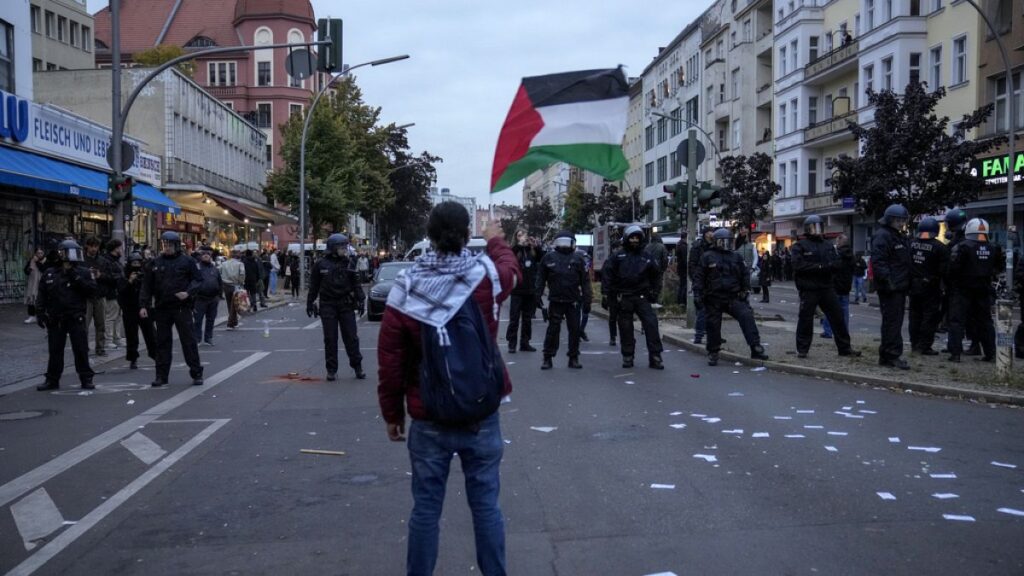Germany is treading a line between protecting freedom of speech and maintaining its support for Israel.
A pro-Palestinian protest marking the anniversary of the 7 October attacks and the start of the war between Israel and Hamas drew thousands in Frankfurt on Monday, after a higher court scrapped the city’s official ban on the event.
The decision to block the demonstration was led by the city’s mayor Mike Josef, who said that holding the protest on the date of the anniversary was “provocative”, could constitute antisemitism, and had the potential to incite criminal acts.
The city’s higher court overturned the ban, saying that the City of Frankfurt was “misjudging the constitutional right of freedom of assembly and expression”.
The verdict, which was upheld by the State Administrative Court of Hesse, said that although the statements made by the person who registered the protest could be considered provocative and even antisemitic, they failed to show “criminal relevance”.
The court added that the protest also did not appear to constitute any kind of immediate danger that could not be handled by police intervention.
Demonstrators, who according to local media numbered in their thousands, marched through Frankfurt’s city centre waving both Palestinian and Lebanese flags.
The protesters reportedly shouted “From the river to the sea, Palestine will be free” — a highly contentious phrase that German police have frequently invoked as a reason to to deny permission for organised pro-Palestinian protests.
War of words
The slogan refers to the land between the Jordan River on the east and the Mediterranean Sea to the west, an area that encompasses both Israel and the occupied Palestinian territories.
Some claim that the expression calls for the eradication of Israel, with others say it is simply a way for Palestinians to express their desire for a state in which they can live as equal citizens.
German courts have interpreted the phrase with both less and more severity, after interior minister Nancy Faeser banned it last November, claiming it was a “Hamas slogan.”
In Bavaria a court decided that a protest in Munich that wished to use the slogan could go ahead, citing the importance of freedom of assembly.
However in August, 22-year-old German Iranian, Ava Moayeri, was ordered to pay a €600 fine after shouting it at a rally in Berlin.
The judge in the case concluded that the phrase constituted a denial of Israel’s right to exist and an endorsement of Hamas, adding that Germany in particular had a national obligation to make Jewish people feel “safe” after its role in the Holocaust.
Moayeri’s lawyer said that the verdict was a win for “state oppression” of protesters and that his team would appeal it.
Last week, Germany’s Interior Ministry clamped down even further, announcing new regulations which said that individuals who post, comment or even like the slogan on social media would not be eligible for German citizenship after the country allowed dual citizenship for the first time in June.
Activists in Germany argue that the police have become increasingly aggressive towards pro-Palestinian protesters, posting videos on social media that appear to show police beating protesters at similar rallies as Germany struggles to balance freedom of speech with what German Chancellor Olaf Scholz calls its “historical responsibility” to Israel.
Frankfurt’s protest mirrored others in German cities on the anniversary of the attacks, including one in Berlin where four people were detained after protesters launched pyrotechnics and set fire to car tires.
In Stuttgart, a 45-year-old man was arrested for wearing a mask after attending a rally of around 200 people, according to local media.
The war between which Israel and Hamas has sparked demonstrations across the world, beginning on 7 October 2023 when Hamas launched a terrorist attack on Israel, killing 1,200 people and abducting more than 200.
Israel’s year-long bombardment of Gaza in retaliation for the attack has led to the deaths of more than 41,000 Palestinians, according to local health authorities. The war has now expanded to the Israel-Lebanon border, with strikes hitting not just southern Lebanon but even the capital, Beirut.
Read the full article here

